arranged marriage
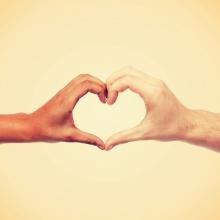
When I reached high school and started dating, my relatives had a lot of questions: "This girl you’re going to the movies with: Is she Catholic? Slovak? What’s her family’s last name? What does her father do for a living?"
She had to be Catholic, of course. Preferably Slovak. If not, some other nearby nationality. Anything less would get disapproving comments. Those questions may sound odd now, but they mattered back then. The Catholic Church had only recently concluded Vatican II, which tried to bridge centuries of animosity between churches. Accepting Protestants as equals was something new. And many of the immigrants in my neighborhood were trying to preserve the culture and traditions that they brought from Europe. They were afraid of losing their heritage in the new land.
For them, traditional marriage meant choosing someone from the same faith, the same ethnic background. Simply put, they were afraid. Terrified, actually. They feared that if marriage changed, their world would fall apart.
That's why to so many people, my relationship wasn’t about finding someone who fit me — it was more about me finding someone who fit them.
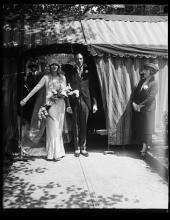
On Valentine’s Day, American husbands and wives of every age, faith, and region will shower their beloveds with symbols of undying affection — flowers, chocolates, moonlit dinners, kisses.
The annual Feb. 14 lovefest is also a popular time for elaborate engagements, with picturesque proposals and pricey jewelry.
But any link between love and matrimony is relatively recent, said Stephanie Coontz, who teaches history and family studies at the Evergreen State College in Olympia, Wash.
And a radical one at that.
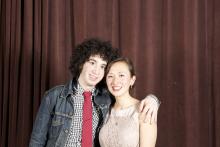
Editor’s note: Judilee King, 22, and Glenn Haider, 23, both grew up in the Unification Church, which is perhaps best known for its arranged marriages and mass wedding ceremonies. The couple will be married at a mass religious wedding in South Korea on Feb. 12. Judilee, who grew up in Nova Scotia, plans to enroll in college in the fall. Glenn, who grew up in New Jersey, is a student at Montclair State University.
Glenn Haider and I first met on Facebook. I was attending community college in Seattle and he was in New Jersey, and while we had a lot of mutual friends through our church, we had never met. His status updates kept popping up on my news feed and one day, mostly out of boredom, I decided to chat him up to see what he was like.
We hit it off and started talking more. Eventually he asked for my number and we started texting. I thought of it as a friendship. We kept talking for a couple of weeks, until it got to a point where I was wondering if he was thinking I wanted something more than a friendship.
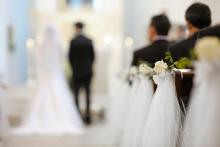
Elke Thompson’s high-school friends think she’s nuts, she said. But in the Unification Church, arranged marriages are the norm. The Rev. Sun Myung Moonteaches that romantic love leads to sexual promiscuity, mismatched couples and dysfunctional societies.
Several religions practice arranged marriages. Hindu and Jewish matchmakers abound, for instance. But rarely does it rise to the level of dogma. Unificationists believe that marriages arranged through the church and blessed by Moon are “sinless” and foster the kingdom of God on earth, one happy family at a time.
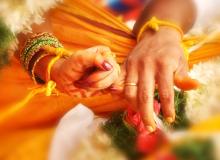
Kamna Mittal and her husband moved to the Bay Area soon after they were married in India in 2000. In addition to being in a new country, the couple were new to each other. Their marriage had been arranged.
"When you go for an arranged marriage," she said, "it's a total gamble."
Now a mother of two, Mittal counts herself lucky that it worked out, but 12 years later, she wants to help Indian-American singles in the Bay Area meet directly.
Turns out even love can use a little help every now and then, and the age-old practice of arranged Hindu marriages is getting a 21st-century makeover.